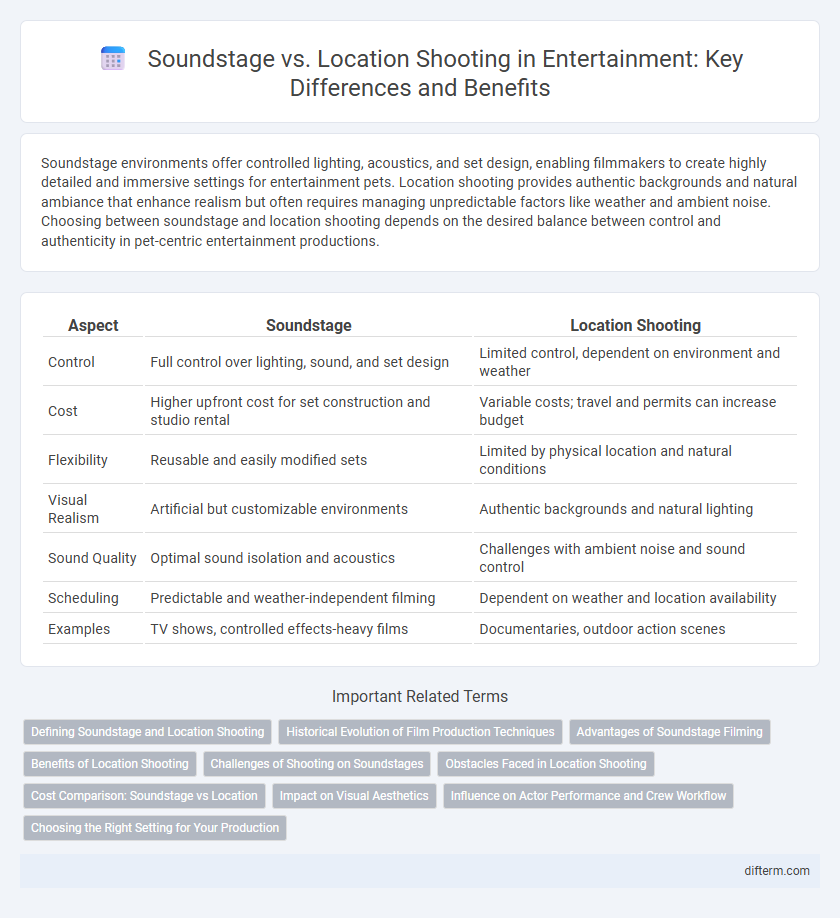Soundstage environments offer controlled lighting, acoustics, and set design, enabling filmmakers to create highly detailed and immersive settings for entertainment pets. Location shooting provides authentic backgrounds and natural ambiance that enhance realism but often requires managing unpredictable factors like weather and ambient noise. Choosing between soundstage and location shooting depends on the desired balance between control and authenticity in pet-centric entertainment productions.
Table of Comparison
| Aspect | Soundstage | Location Shooting |
|---|---|---|
| Control | Full control over lighting, sound, and set design | Limited control, dependent on environment and weather |
| Cost | Higher upfront cost for set construction and studio rental | Variable costs; travel and permits can increase budget |
| Flexibility | Reusable and easily modified sets | Limited by physical location and natural conditions |
| Visual Realism | Artificial but customizable environments | Authentic backgrounds and natural lighting |
| Sound Quality | Optimal sound isolation and acoustics | Challenges with ambient noise and sound control |
| Scheduling | Predictable and weather-independent filming | Dependent on weather and location availability |
| Examples | TV shows, controlled effects-heavy films | Documentaries, outdoor action scenes |
Defining Soundstage and Location Shooting
Soundstage refers to a controlled indoor environment designed for film and television production, offering precise control over lighting, sound, and set design to create specific scenes. Location shooting involves filming in real-world outdoor or indoor settings outside the studio, providing authentic backgrounds and natural elements that enhance realism. These two methods differ fundamentally in terms of control, cost, and visual authenticity in entertainment production.
Historical Evolution of Film Production Techniques
Soundstage filming revolutionized early film production by enabling controlled environments crucial for consistent lighting and sound, significantly advancing cinematic techniques during the 1920s and 1930s. Location shooting gained popularity in the 1960s as technological innovations like portable cameras and improved sound equipment allowed filmmakers to capture authentic environments, enhancing realism in storytelling. The historical evolution from studio-bound soundstages to dynamic location shoots reflects the industry's shift towards immersive visual narratives and technical versatility.
Advantages of Soundstage Filming
Soundstage filming offers controlled environments that allow precise manipulation of lighting, sound, and set design, which enhances production quality and consistency. This method minimizes unpredictable variables like weather or ambient noise, reducing delays and reshoots, thereby saving time and budget. Soundstages also facilitate complex special effects and multi-camera setups, ensuring seamless integration of visual elements critical for high-concept entertainment projects.
Benefits of Location Shooting
Location shooting provides authentic backgrounds and natural lighting that enhance the visual realism and emotional impact of a film. It offers unique environmental elements and spontaneous opportunities that are difficult to replicate on a soundstage, creating a more immersive audience experience. Capturing real settings also allows filmmakers to reduce set construction costs while benefiting from diverse and dynamic landscapes.
Challenges of Shooting on Soundstages
Shooting on soundstages presents challenges such as limited space, which restricts camera movement and large set designs, impacting the creativity of scene composition. Environmental control demands precise lighting and sound engineering to mimic natural settings realistically, requiring advanced technical expertise and equipment. Furthermore, the artificial nature of soundstages can make achieving authentic performances and organic atmosphere more difficult compared to on-location shoots.
Obstacles Faced in Location Shooting
Location shooting encounters significant obstacles such as unpredictable weather conditions that disrupt schedules and affect sound quality. Managing ambient noise from traffic, crowds, and environmental sounds poses challenges for capturing clean audio on-site. Securing permits and controlling logistics in public or remote areas further complicate production compared to the controlled environment of a soundstage.
Cost Comparison: Soundstage vs Location
Soundstage production typically incurs higher fixed costs due to studio rental, set construction, and controlled environment expenses, but offers savings on logistics and weather-related delays common in location shooting. Location shooting can reduce set-building costs and provide authentic backdrops but often involves substantial expenses in permits, travel, transportation, and managing unpredictable conditions. Balancing these factors, productions choose soundstage setups for budget predictability and efficiency, while location shoots are favored for realism despite potentially higher variable costs.
Impact on Visual Aesthetics
Soundstage shooting allows precise control over lighting, set design, and camera movement, enhancing visual aesthetics with consistent and stylized imagery. Location shooting delivers authentic backdrops and natural lighting, enriching scenes with realism and unique atmospheric qualities. The choice between soundstage and location critically influences the film's visual tone, atmosphere, and immersive experience.
Influence on Actor Performance and Crew Workflow
Soundstage environments offer controlled lighting, acoustics, and set design, allowing actors to deliver consistent performances without external distractions, while crew members benefit from streamlined shooting schedules and easier equipment management. Location shooting provides authentic settings that can inspire more natural and spontaneous actor performances, though it often introduces unpredictable variables such as weather and ambient noise that require flexible crew coordination and adaptive workflow strategies. Balancing these factors, productions must weigh the enhanced control of soundstages against the immersive realism of location shoots to optimize both actor output and crew efficiency.
Choosing the Right Setting for Your Production
Soundstage environments offer controlled lighting, acoustics, and weather conditions, making them ideal for consistent and efficient filming. Location shooting provides authentic backdrops and natural ambiance, enhancing realism and audience immersion. Selecting between soundstage and location depends on budget, creative vision, and logistical needs to optimize production quality and workflow.
soundstage vs location shooting Infographic

 difterm.com
difterm.com